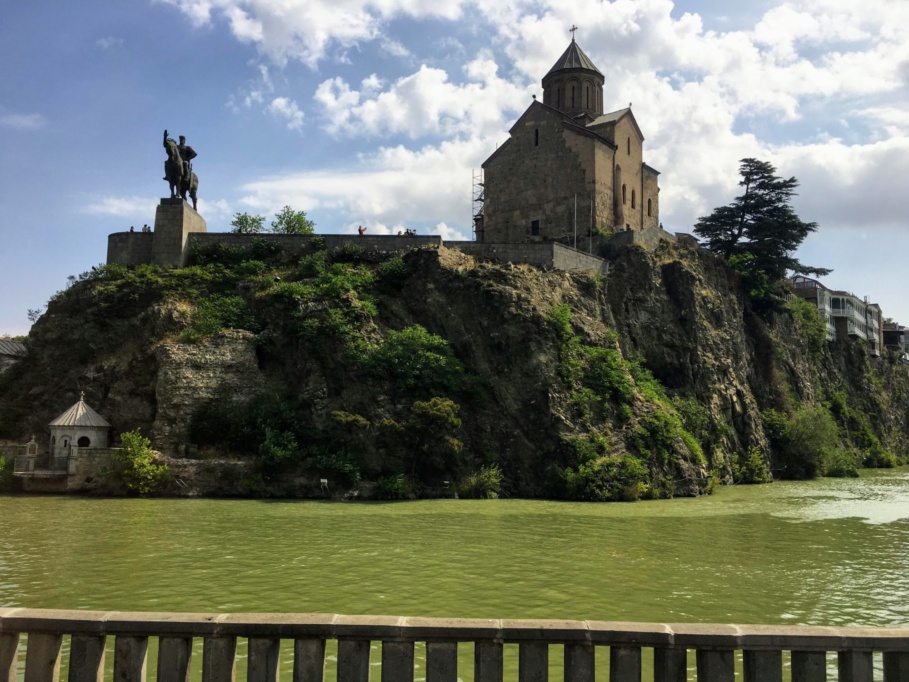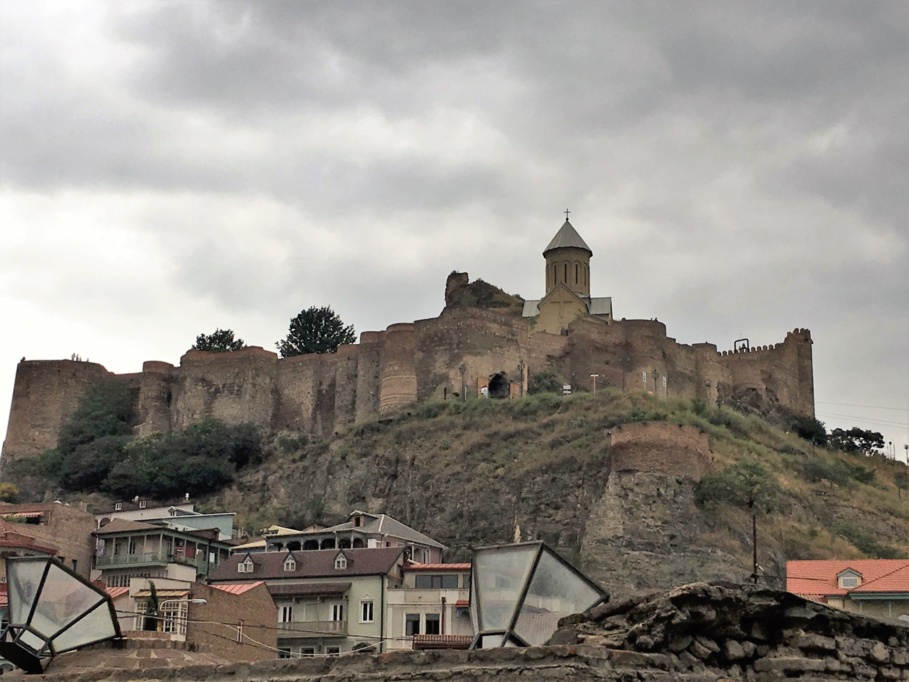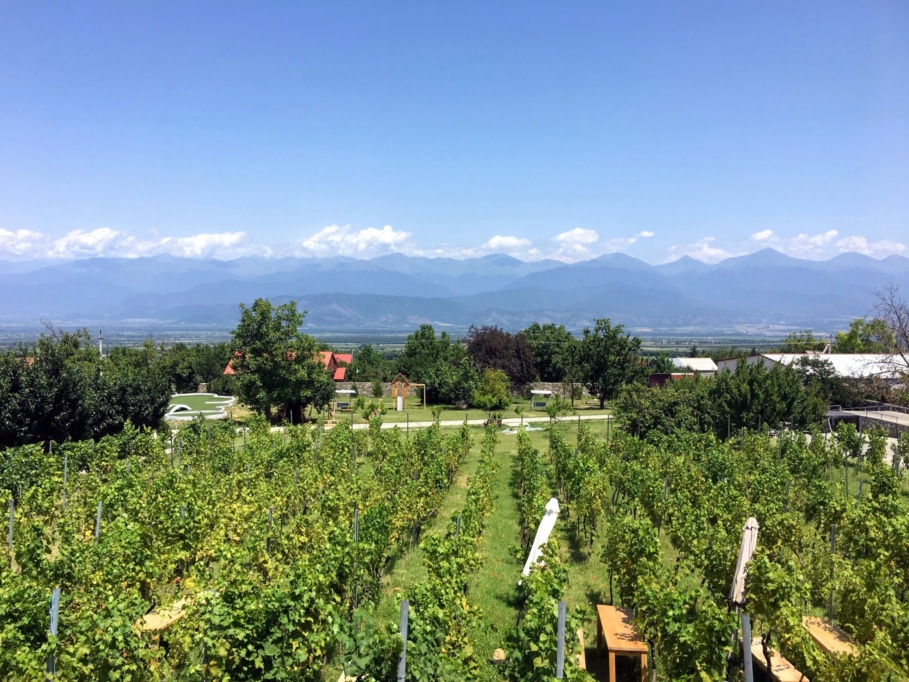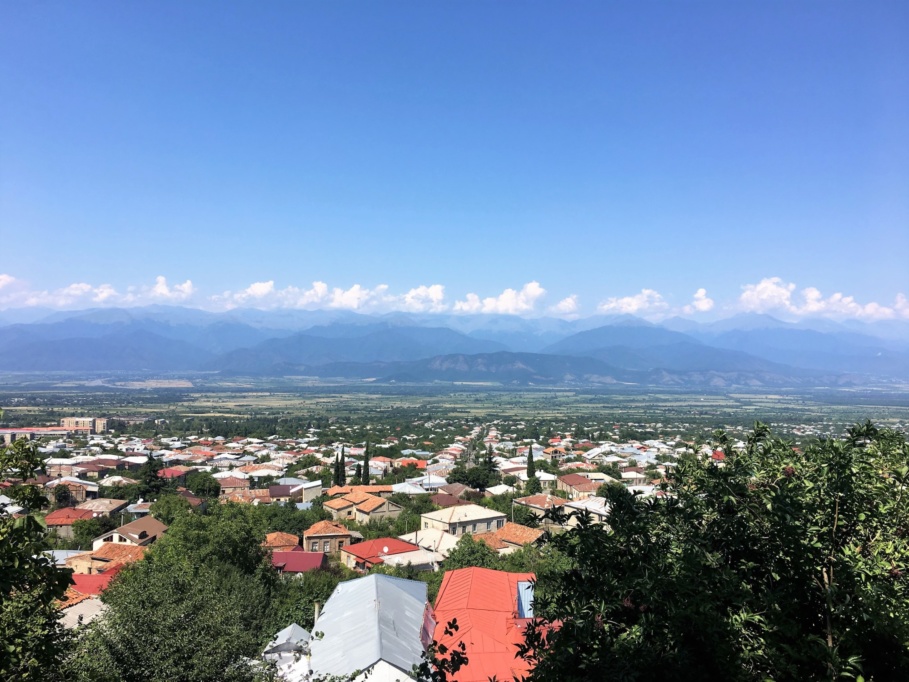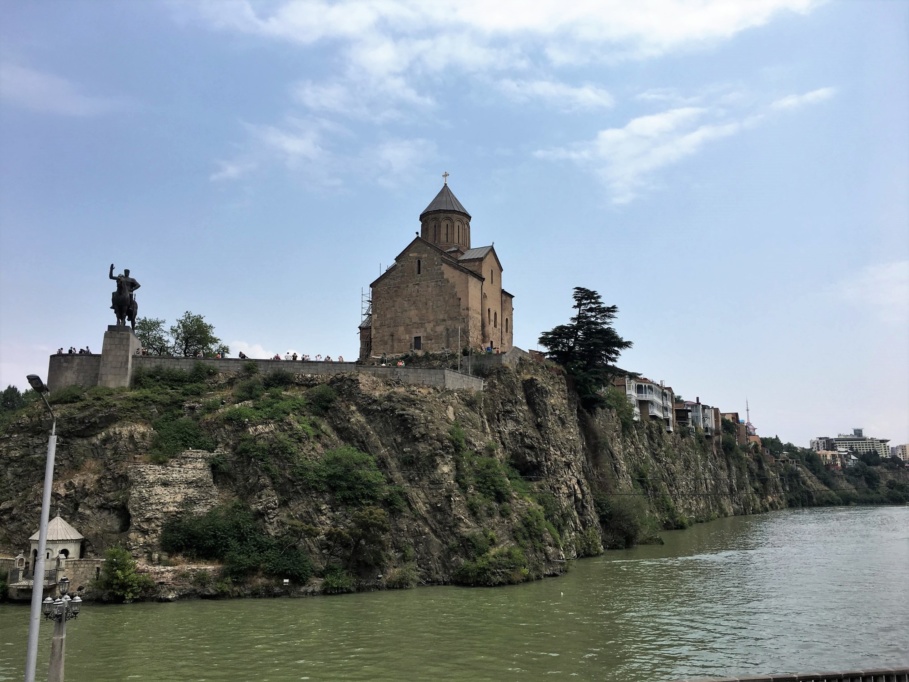GEORGIA
TRAVEL GUIDE
Discover the enchanting allure of Georgia with our comprehensive Gerogia travel guide. Nestled at the crossroads of Europe and Asia, Georgia boasts a rich tapestry of history, culture, and breathtaking landscapes. From the ancient charm of Tbilisi to the serene beauty of the Caucasus Mountains, explore the diverse experiences that await. Whether you’re a history buff, a nature enthusiast, or a culinary adventurer, our guide provides essential tips and insights to make your journey through Georgia unforgettable.
Georgia Itineraries
Top 5 Things To See And Do Georgia
Need To Know - Georgia Travel Guide
Five Quick Facts About Travelling In Georgia
- Most countries are visa exempt for up to 12 months (See Visa Tab)
- Georgia has a very good mini bus and bus network that will take you just about anywhere. TOP TIP Write down or do a screenshot of the name of the town you wish to go to. Buses will have the name of their destination on a sign at the front of the bus however it will always be in Georgian only and impossible to read (unless you read Georgian)
- Example Telavi is თელავი and თელავი is what will be on the bus…and do not expect any English to be spoken at the bus station.
- Georgian Drivers are crazy and if there are road rules they do not seem to apply.
- Beware of the Georgian white sheep dogs – some are wild and most semi wild. They are very vicious, attack without provocation and can kill. They can be found all over the Georgian countryside and in the mountains.
- Visitors cannot travel to the disputed regions of South Ossetia or Abkhazia.
Weather In Georgia
Georgia has very warm to hot summers and cold winters
Western Georgia
Along the Black sea coast, from Abkhazia to the Turkish border, and in the region known as the Kolkhida lowlands inland from the coast, the dominant subtropical climate features high humidity and heavy precipitation. Several varieties of palm trees grow there. Midwinter average temperature here is 5c and the midsummer average is 22c.
Eastern Georgia
The plains of eastern Georgia are shielded from the influence of the Black sea by mountains of Likhi that provide a more continental climate. Average temperature in summer here is 20-24c, in winter 2-4c. Humidity is lower.
Alpine and highland regions in the east and west, as well as semiarid region on the Iori plateau to the southeast have distinct microclimates. Alpine conditions start at 2,100 meters and above 3,600 meters year-round snow and ice is present.
The best suggestions for travelers would from late spring till early fall tours, in winter snow resorts in the Caucasus mountains.
Money In Georgia
The Georgian Currency is the Georgian Lari.
There are ATMs widely available in towns across Georgia although if travelling to small villages or into the mountains is is advisable to have cash on you.
Visas In Georgia
Nationals of the following countries and territories may visit Georgia without a visa for a year (unless otherwise noted)
| All citizens of the E.U | Canada | Liechtenstein | Seychelles |
| Albania | Chile (90 days per 180-day period) | Malaysia | Singapore |
| Andorra | Colombia | Mauritius | South Africa |
| Antigua and Barbuda | Costa Rica | Mexico | South Korea |
| Argentina | Dominican Republic | Moldova | Switzerland |
| Armenia | Ecuador | Monaco | Tajikistan |
| Australia | El Salvador | Montenegro | Thailand |
| Azerbaijan | Honduras | New Zealand | Turkey |
| Bahamas | Iceland | Norway | Turkmenistan |
| Bahrain | Iran (45 days) | Oman | United Arab Emirates |
| Barbados | Israel | Panama | Ukraine |
| Belarus | Japan | Qatar | United Kingdom |
| Belize | Jordan | Russia | United States |
| Bosnia and Herzegovina | Kazakhstan | Saint Vincent and the Grenadines | Uruguay (90 days) |
| Botswana | Kuwait | San Marino | Uzbekistan |
| Brazil | Kyrgyzstan | Saudi Arabia | Vatican City |
| Brunei | Lebanon | Serbia |
Holders of passports of the following countries and territories can obtain multiple-entry e-Visas online for a fee prior to arrival.
| 90 days per 180-day period | 31 days per 120-day period | ||
| Cuba | North Macedonia | Angola | Egypt |
| Dominica | Palau | Benin | Equatorial Guinea |
| East Timor | Paraguay | Bhutan | Eritrea |
| Grenada | Peru | Burkina Faso | Eswatini |
| Guatemala | Saint Kitts and Nevis | Burundi | Ethiopia |
| Kiribati | Saint Lucia | Cambodia | Fiji |
| Marshall Islands | Samoa | Cape Verde | Guinea-Bissau |
| Micronesia | Central African Republic | Guyana | |
| China | Haiti | ||
| Comoros | Hong Kong | ||
| Djibouti | India | ||
** Disclaimer – This information is a guide only. Please do your own research.
Georgia Border Crossings
Azerbaijan – Georgia Border Crossing
Balakan – Lagodekhi: Connecting Sheki and Telavi this is a beautiful drive through pretty countryside. This crossing is a relatively quiet border crossing. Money exchange and an ATM are available on the Georgian side of the border.
Mini-buses run from Sheki to Balakan daily, then take a taxi the remaining 16km to the border. Once you have crossed the border and are in Georgia take a taxi to the Lagodeki bus stop where you can pick up a mini-bus to destinations such as Tbilisi and Telavi.
Read More On Crossing the Azerbaijan-Georgia Border Crossing
Shikhli/Sixli – Tsiteli/Red Bridge
This is the main and busiest border crossing between Azerbaijan and Georgia, connecting Rustavi (GEO) with Qazax (AZ).
Public transport is easily available on both sides of the border as are exchange places.
If catching the train between Baku and Tbilisi this is the border you will cross at.
Georgia – Armenia Border Crossing
Bagratashen – Sadakhlo: This border crossing is on the main road between Tbilisi and Yerevan and therefore the most popular. There is lots of transport between Tbilisi and Yerevan.
Gogavan – Guguti: This border is open for international travelers however the last 12 kms are on a mud track.
Bavra – Ninotsminda: This border is open for international travelers and straight forward to cross at.
Georgia – Turkey
Hopa – Sarp: The busiest and easiest border crossing although queues can be long it can take time to clear customs. There is plenty of public transport going between Hopa and Batumi or Tblisi going across the border. From the border you can also take a bus to the center of Batumi or Hopa.
There is no bank or ATM at this crossing.
Posof – Vale: A quiet border crossing with limited public transport options so unless you have your own car it can be difficult to cross at this border.
If you are game you can make your way from Tbilisi to Akhaltsikhe and then get a taxi to the border. Once over the border and into Turkey you can get a taxi from the border to Posof and then a mini bus to Kars (2.5hrs). There are money changing facilities at the border.
Aktas-Kartsakhi/Cildir: This border crossing was closed from 1995 to 2015. In Georgia make your way to Kartsakhi and then get a taxi or minivan (which run infrequently) to the border. Once in Turkey you can get a minivan to Cildir (20kms) and then on from there.
Georgia – Russia
Kazbegi/Dariali – Verkhny / Lars border crossing.
Open to International travellers although with continued Georgian – Russian tensions it is best to watch watch the situation carefully. During winter snow falls can be heavy making it slow and difficult going.
From Georgia to Russia: A bus departs daily at 5 am from Tbilisi to Vladikavkaz or you can take a taxi the same route.
Russia to Georgia: Buses and minibuses leave from the bus station 1 on Arkhonskoye Highway in Vladikavkaz, Be warned they fill quickly so book ahead or get there early. Taxis are also available and leave from the same place.
South Ossetia – Georgia border crossing: Artsevi: Officially, South Ossetia can only visited from Russia.
Georgia Travel Guide | How To Travel To Georgia
Enchanting Georgia Travel Guide: Ultimate Travel to Georgia
Welcome to the Georgia Travel Guide, your ultimate resource for planning an unforgettable journey to one of the world’s most captivating destinations. Nestled at the crossroads of Europe and Asia, Georgia offers a unique blend of history, culture, breathtaking landscapes, and mouthwatering cuisine. Whether you’re drawn to the ancient streets of Tbilisi or the scenic beauty of the Caucasus Mountains, this guide will help you navigate every aspect of your Travel to Georgia.
How to Plan a Trip: Georgia Travel Guide
When planning your Travel to Georgia, timing is everything. Georgia is a year-round destination, but the best time to visit depends on your interests. Spring (April to June) and autumn (September to November) offer mild temperatures, ideal for city exploration and mountain hikes. Winter (December to February) is perfect for ski enthusiasts, with top resorts like Gudauri and Bakuriani. Meanwhile, summer (July to August) beckons beach lovers to the Black Sea coast, particularly in Batumi.
Visa Requirements: Georgia Travel Guide
The Georgia Travel Guide highlights that citizens of many countries, including the EU, USA, Canada, and Australia, can enter Georgia visa-free for up to one year. However, it’s crucial to verify the specific visa requirements for your nationality on the official Georgian consular website before you Travel to Georgia.
Getting There: Georgia Travel Guide
The primary entry point for most visitors is Tbilisi International Airport (TBS), with flights from major cities across Europe, the Middle East, and Asia. Kutaisi International Airport (KUT) and Batumi International Airport (BUS) also serve international flights, making Travel to Georgia convenient from various regions. Overland travel is possible from neighboring countries, offering scenic routes through the Caucasus.
Accommodation Options: Georgia Travel Guide
Accommodation in Georgia ranges from budget hostels to luxury hotels. In cities like Tbilisi, Batumi, and Kutaisi, you’ll find international hotel chains, boutique hotels, and charming guesthouses. For a more authentic experience during your Travel to Georgia, consider staying in family-run guesthouses in rural areas, where you can enjoy home-cooked meals and warm hospitality.
Transportation: Georgia Travel Guide
Getting around Georgia is straightforward, with options like trains, buses, marshrutkas (minibuses), and car rentals. Trains connect major cities, providing comfortable travel through scenic landscapes. Marshrutkas are a popular, affordable option for reaching smaller towns and villages during your Travel to Georgia. Renting a car gives you the freedom to explore at your own pace, although be prepared for varied road conditions.
Georgia’s Rich History: Georgia Travel Guide
The Georgia Travel Guide wouldn’t be complete without delving into the country’s rich history. From the ancient Kingdoms of Colchis and Iberia to its Christian heritage dating back to the 4th century, Georgia’s history is a tapestry of cultural influences. The medieval period marked a golden age under King David IV and Queen Tamar, with significant developments in art, culture, and military power. Today, Georgia’s history is preserved in its ancient churches, fortresses, and UNESCO-listed sites.
Georgian Cuisine: Georgia Travel Guide
Georgian cuisine is a feast for the senses, and any Travel to Georgia would be incomplete without indulging in its culinary delights. From the cheese-filled bread khachapuri to the spiced meat dumplings khinkali, Georgian food is rich in flavor and tradition. Don’t miss the chance to try dishes like Badrijani Nigvzit (eggplant with walnut paste) and Satsivi (chicken in walnut sauce), which are staples of the local diet.
Georgian Wine: Georgia Travel Guide
Georgia is known as the birthplace of wine, with a winemaking tradition that spans over 8,000 years. The country’s unique use of qvevri (large clay vessels) for wine fermentation and aging sets Georgian wine apart. Regions like Kakheti are renowned for their vineyards and offer wine tours where you can taste local varieties such as Saperavi and Rkatsiteli. Your Travel to Georgia would be incomplete without experiencing the rich flavors of Georgian wine.
Safety and Practical Tips: Georgia Travel Guide
Georgia is generally safe for travelers, but the Georgia Travel Guide recommends taking standard precautions. Keep an eye on your belongings in crowded areas, and exercise caution when driving, especially in mountainous regions. Tap water is safe in major cities, but bottled water is recommended in rural areas. Also, stay informed about the political situation, particularly in regions like Abkhazia and South Ossetia, where travel is not advised.
Conclusion: Georgia Travel Guide
Your Travel to Georgia promises to be a journey filled with cultural richness, historical depth, and natural beauty. With this Georgia Travel Guide in hand, you’re well-equipped to explore everything this captivating country has to offer. From its ancient landmarks to its vibrant cities and delicious cuisine, Georgia awaits your discovery.
